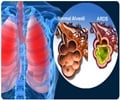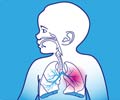Aspirin desensitization may improve alcohol-induced symptoms of Aspirin Exacerbated Respiratory Disease (AERD), study at the University of Pennsylvania School of Medicine finds. In aspirin desensitization, gradually-increasing doses of aspirin are given to reduce sensitivity.
- Aspirin desensitization may reduce symptoms of Aspirin Exacerbated Respiratory Disease (AERD) worsened by alcohol.
- Aspirin Exacerbated Respiratory Disease (AERD) is a chronic inflammatory disease involving nose, sinuses, and lungs.
- In aspirin desensitization allergists give gradually increasing doses of aspirin to reduce aspirin sensitivity.
Penn's approach is uniquely multidisciplinary in that it also involves surgery to remove any pre-existing nasal polyps that have formed as a result of AERD. It is the only such multidisciplinary AERD center in the world.
"Without the surgery, the aspirin desensitization would leave the previously established inflammatory disease untreated, and without the work of the allergist, the polyps would return, so the dual approach is critical," Bosso said.
In this study, Bosso and his team evaluated 37 AERD patients who underwent both surgery and aspirin desensitization. Patients were enrolled between October of 2015 and October of 2017 at both Penn and Scripps Clinic Carmel Valley in California. Before treatment, 78 percent of patients said they could only tolerate alcohol about half the time or less, while 42 percent said they never or almost never were able. The most common symptoms associated with drinking alcohol were nasal congestion (97 percent), a runny nose (47 percent), and wheezing (40 percent). The majority of patients said these symptoms were brought on by as little as one to three glasses of wine in and as quickly as 15 minutes to an hour.
Following aspirin desensitization, 86.5 percent of patients said they could drink alcohol without experiencing these symptoms, and 70 percent of patients described the desensitization as "very helpful" or "extremely helpful" for their ability to tolerate alcohol. Only four patients noted no improvement in their symptoms. Patients also reported it took more alcohol or a longer period of time for these symptoms to occur.
Bosso notes that the study is not without its limitations, including the lack of a control group for comparison. Further, seven patients enrolled in the study but were not included for evaluation after they couldn't complete the treatment due to adverse reactions such as gastrointestinal problems.
References:
- Aspirin Desensitization Improves Alcohol-Induced Allergies in Patients with Underlying Respiratory Disease - (https://www.pennmedicine.org/news/news-releases/2018/july/aspirin-desensitization-improves-alcohol-induced-allergies)
Source-Eurekalert














